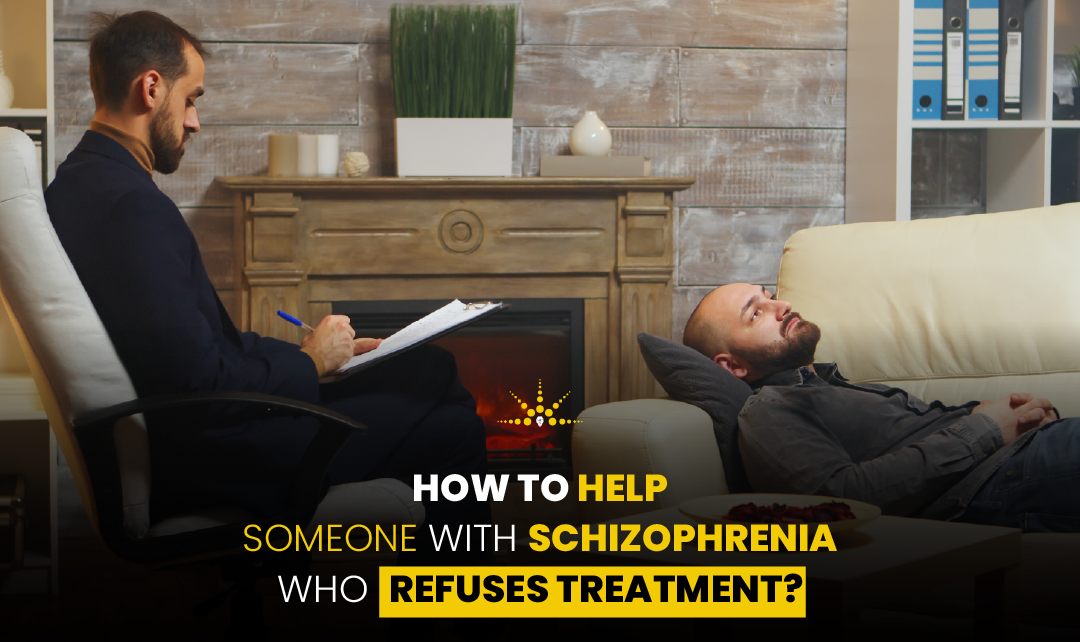Imagine a challenging mental health disorder like schizophrenia. Imagine that it comes with issues like false beliefs, seeing things that aren’t there, and chaotic thoughts.
How tough would it be if someone you care about had this but didn’t want help? It’s tough for everyone. The key to helping is understanding conditions, patience, and smart tactics.
So, let’s talk about how to help a loved one with schizophrenia who’s not keen on getting or sticking to treatment.
Are you seeking treatment for schizophrenia in a loved one who suffers from it?
You can get assistance in this matter from Safestar Psychiatric and Wellness LLC.
What to Do When a Loved One with Schizophrenia Refuses Treatment?
Have you ever wondered, “How do I handle my dear one refusing treatment for schizophrenia?” It’s hard when a close person has mental health issues—even tougher when they reject assistance.
Various assertions may be stopped, your dear one might refuse to believe, and the illness might prevent them from seeking help if they get anxious, suspicious, or false beliefs.
If your loved ones with schizophrenia reject help, even as their condition worsens, it may be time to find other ways to support them. Convincing them to do something they’ve fought for can be tough without a guardian.
Convincing them to accept help is the first step in assisting a loved one with schizophrenia. Often, those struggling with this disorder have difficulty thinking logically or have inconsistent rational thinking.
Not understanding why you’re suffering is common, with anosognosia—a condition where people don’t realize they have a severe mental disorder—affecting around half of those with the illness.
Hallucinations, or delusions, may influence individuals with schizophrenia. Arguing about the reality of these experiences isn’t helpful.
Instead, comfort them without releasing judgment.
Rather than attacking them with advice, focus on a specific problem linked to their condition, like constant fatigue or physical discomfort.
They might be more open to visiting a doctor if they have a say. Allow them to choose a doctor, select from different locations, or decide who accompanies them. This strategy may encourage your loved one to consult with their doctor.
Tips for Assisting a loved one with Schizophrenia
Here are some steps to assist your loved ones with schizophrenia.
First, Educate Yourself: Understanding schizophrenia and its treatment helps you make better decisions. These could be about managing symptoms, inspiring your family member to seek self-help, overcoming setbacks, or progressing towards recovery.
Second, Reduce Stress: Since stress can trigger schizophrenia symptoms, providing a supportive, well-organized environment is required.
Third, Set Realistic Expectations: Recognize that schizophrenia comes with challenges. Assist your loved one in setting achievable goals and be patient during recovery.
Lastly, Empower Your Loved One: Be cautious not to overstep, and do things they can handle themselves. Offer support, but encourage independence and self-help as much as possible.
Move Them toward Treatment and Motivate Self-Help
These are key things you can do for a loved one suffering from schizophrenia. Medicines play a vital role in treating schizophrenia, but it doesn’t end there.
Your loved one’s recovery is influenced by many factors. Self-help methods like switching to a nutritious diet, dealing with stress, regular workouts, and building social relations can strongly impact their symptoms, emotions, and self-worth.
The more they desire personal improvement, the less they’ll feel lost and helpless. This could even help their doctor in reducing their medication. Your cheers and support could be the motivation for your loved one to initiate and stick with a self-help program.
Start Treatment
Starting the healing process often means the first hurdle is getting the individual with schizophrenia to agree to a doctor’s visit. When delusions, hallucinations, and paranoia seem real to those experiencing them, the idea of medical help won’t make sense. If a family member with schizophrenia doesn’t want to see a doctor,
Here’s what you can try:
- Give Choices: If the person feels they have some control over what’s happening, they might be more open to a doctor’s visit. If they’re cautious around you, suggest someone else to go with them. Or offer a selection of doctors.
- Focus on a Specific Symptom: A person with schizophrenia may avoid a doctor, scared of being seen as “crazy”. To make the doctor seem less daunting, propose visiting about a specific issue, such as sleeplessness or low energy.
How to Support a Loved One During Treatment?
When your loved ones is going through therapy, building a group of loved ones to offer help is beneficial.
This approach reduces the risk of others experiencing “burnout” from giving continuous support.
The assistance group, (no matter if it’s 2 or 10), should spot signs of a potential lapse. Schizophrenic patients usually show signs when they skip their medicine.
These signs could include:
- Jumbled thoughts
- Hallucinations
- Delusions
- Thinking about suicide
- Seclusion and withdrawal
- Trouble getting thoughts
- Strangely behaving
When your friend or family member is taking therapy, make sure to help without attempting to “solve” everything.
Let them accomplish minor tasks on their own, encouraging a sense of self-empowerment, and marking their progress toward independence. Suggest fun activities they enjoy, like exercise, music, art, or a movie outing.
How to Build a Deeper Connection with Someone You Care About?
Try this:
- Make space in your day to talk, just the two of you.
- Turn off the phone, put tasks aside, and minimize background noise. Minimize the crowd too.
- Enjoy comfortable silence.
- Refrain from filling the quiet with talk.
- Be patient. Ask open-ended questions like, “What worries you about taking your medicine?” instead of “Did you take your medicine?” Be calm. Don’t let your emotions fire up as it may frighten them.
Remember, effective communication is key. Repeat what they say, in your own words. Don’t mimic. Make them feel heard, not mimicked.
Wrapping Up
How to help someone with schizophrenia who refuses treatment?
Supporting a loved one with schizophrenia who refuses treatment is challenging but crucial. Start by educating yourself and offering patience and understanding.
Encourage them to get help by giving choices and focusing on specific symptoms. During treatment, build a supportive network, help them stay on track, and foster a sense of independence.
Effective communication and being there for them can make a significant difference in their journey toward recovery.
FAQs
-
How can I help a loved one who refuses schizophrenia treatment?
It’s important to learn about schizophrenia, build a supportive atmosphere, and gently nudge them toward obtaining professional help. Remember, patient, and clear communication is golden.
-
What are the common symptoms of schizophrenia?
Typical symptoms can be hallucinations (seeing or hearing what’s not real), delusions (unreal perceptions), chaotic thoughts, and avoiding social connections.
- How can I build a better connection with someone who has schizophrenia?
Spend meaningful time, lessen disturbances, be a good listener, and provide a helping hand without attempting to fix everything. Motivate them to maintain an open dialogue and wait patiently.
-
What should I do if my loved one shows signs of worsening symptoms?
Don’t delay, get professional assistance pronto. Urge them to stick to their treatment routine and contemplate reaching out to their healthcare expert for advice.
-
How important is it to involve a support group?
It indeed is! It offers added tools, emotional reinforcement, and practical tips. It counters caregiver fatigue and confirms that both the individual and their caregiver’s receive needed assistance.
-
Can lifestyle changes help manage schizophrenia symptoms?
Yes! Following a healthy lifestyle with balanced eating, regular physical activity, and stress relief can make a positive difference in managing symptoms and general wellness.
-
What should I do if my loved one’s symptoms include suicidal thoughts?
If you find your loved one showing indicators of suicide, don’t hesitate. Immediately reach out to their mental health professional or call for emergency assistance to guarantee their safety and required support.







No comment